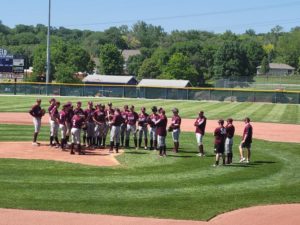Teachers in it for the long run: West’s staff has several marathon runners
November 23, 2016
Marathons got their name from the Battle of Marathon in which a Roman soldier ran 26.2 miles back to Rome from Marathon to tell people of their victory over the Persians. He promptly died after uttering one word: “Nike,” meaning victory.
Despite that, many people now go out and run marathons because they want to, Bellevue West teachers included.
There are thousands of reasons as to why someone would run a marathon. Social Studies teacher Kelly McVey has a more touching reason than most. Her father, a Marine, was diagnosed with an illness the family knew would take his life.
“My second marathon was the Marine Corps Marathon because I promised my dad before he died that I wanted to run it,” McVey said.
Other teachers run half and full marathons because some races are too short for their tastes. Most have been running since high school and felt the 5Ks and 10Ks just didn’t bring the challenge they were looking for anymore.
“If you’re looking at the long-term benefits, you’re looking at workouts that are at least a half hour to hopefully an hour or more than one,” science teacher Brandon Crenshaw said. “So, the short events, as you get better, I don’t think had the long-term benefits I was looking for.”
Of course, it’d be impossible to go out and run a marathon without training. Even with spending eight hours or more at the school on weekdays, the teachers still find or make the time for a run.
“When I train for a marathon, I run between 30 and 40 miles a week, so like six or seven on the weekdays and longer on the weekends,” science teacher Chrissy Ritta said.
Crenshaw was an avid swimmer in high school and even coached at West before he became overloaded with it, only able to do the same thing so many times. He still wanted something physical to do, though, which prompted him to join science teacher Erik Johnson and a few others in running.
To keep himself engaged, Crenshaw’s training includes tempo days, in which he tries to keep the same pace for a certain distance, and barefoot running in his Vibram shoes.
“Much like swimming, it can really get boring if you don’t find a way to make it interesting,” Crenshaw said.
After a race, part of recovery is getting back some of the nutrients lost. It’s not entirely unusual to fall into a routine, craving the same thing after every major race. For the Cross Country team it was Wendy’s, for English teacher Leigh Officer it’s a big chocolate shake, fries, and a cheeseburger.
“It’s always whatever I want to eat or drink immediately after the race,” McVey said. Meaning whatever pops into her head during the run is what she just has to have post-run.
Post-runs are similar between people as there’s only so many combinations of stretching and food. Pre-run is where you get some interesting rituals. For Crenshaw, it involves warming up alone, Diet Coke, and Fig Newtons.
“It sounds weird, but it’s full of complex carbs and simple carbs, it’s easy on your stomach, and it’s that bite size so you can have as much or as little as you want,” Crenshaw said.
While the training can be draining, it pays off when it comes time for the actual race. Running a full marathon, Officer has a personal record of 3 hours, 42 minutes. Crenshaw’s best is 3 hours, 53 minutes, McVey ran a 4:14, and Ritta completed in 4:44.
“The best part is the accomplishment, the camaraderie, the journey of the marathon,” Officer said.






